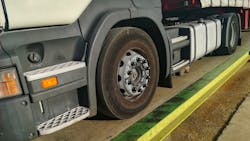When you talk about wheel weights in the tire business, most people assume that the discussion was centered on traditional balance methods. I don’t know how “old school” it is to put a truck tire and wheel on a computer balancer and then attach weights to the flange or rim surface to balance the assembly, but I did it many times 30-plus years ago on an old balancer, so it isn’t exactly new technology. We used lead weights back in the day because that was all we had. Since then, wheel weights have changed with steel and zinc alternatives for those who conduct business in states where it is illegal to install lead wheel weights. It’s not about that either.
I’m talking about the physical weight of the wheel. How much does the actual wheel weigh? I have to be honest and admit that the wheel's weight never crossed my mind when I was a technician. Disc wheels were heavier than demountable rims, and steel was heavier than aluminum. That summed up my thoughts on wheel weights.
It’s probably fair to say that most people in the truck tire and wheel service industry are not concerned with how much a wheel weighs either. To the person demounting or mounting the tire, it doesn’t matter. Same with installing, removing, and inflating; the wheel's weight does not have an impact on anything related to service, so it isn’t an issue.
On the other hand, fleets are very concerned about weight because it directly impacts everything related to the operation of the truck. In my opinion, introducing the next-generation wide-base single tires that replaced traditional duals was a major step for the tire and wheel industry in the battle to reduce weight. Eliminating duals saved hundreds of pounds on the tractor and trailer, allowing bulk haulers and those operating at maximum weight limits to see an immediate return on investment. Improvements in fuel mileage were a bonus, which is why many of the original weight-conscious converts remain committed to single tires instead of duals.
Fuel mileage improvements also led fleets outside of the bulk and maximum weight applications to replace dual tires with single wide-base assemblies; however, there are trade-offs. Some fleets have stuck with them while others have switched back. For the fleets returning to traditional dual assemblies, weight was not intended to be the primary benefit, so it is outweighed by factors like emergency road service costs, retreadability, and availability.
The next generation of greenhouse gas (GHG) emissions standards is forcing fleets to focus on limiting emissions and improving fuel economy. Reducing a vehicle’s overall weight plays a critical role in the process, so manufacturers and fleets are focused on making things lighter. With GHG Phase 2 in place through model year 2027, major changes for trucking are on the horizon. Wheel weight is just one of them.
The push to lighten the truck favors aluminum wheels. Standard 22.5 x 8.25 hub-piloted aluminum disc wheels from the major manufacturers range from 38-45 lbs. A difference of 7 lbs might not seem like much, but it results in a 126-lb weight savings on all 18 tractor and trailer positions. The comparable steel wheels are in the 65-68 lb range, which can be as much as a 540-lb weight increase when compared to aluminum. GHG Phase 2 definitely gives aluminum an advantage over steel.
As emission standards transition into the vocational and work truck space, the pressure on steel wheel manufacturers will increase. Whether it’s new alloys or designs, the steel wheel industry will have to find a way to compete in order to preserve the option moving forward. Naturally, fleets can expect higher costs to accompany the technology, but GHG Phase 2 compliance is not an option for a growing number of companies. The U.S. Environmental Protection Agency is laser-focused on reducing emissions. Price is not a factor for government officials inside the Beltway.
The race to reduce the weight of commercial vehicles has been going on for years, but it is about to get ramped up. Automobile manufacturers have been doing it for decades with Corporate Average Fuel Economy standards that have replaced steel with plastic, aluminum, and other lightweight materials. Truck manufacturers looking for a few pounds here and a few pounds there to improve fuel economy can save up to 30 lbs a wheel by using aluminum instead of steel. If technology doesn’t close that gap, steel wheels may not even be an option on new trucks in the future.
About the Author
Kevin Rohlwing
Kevin Rohlwing is the SVP of training for the Tire Industry Association. He has more than 40 years of experience in the tire industry and has created programs to help train more than 180,000 technicians.
